India’s stock market is soaring as investors, seeking an alternative to China’s faltering economy and oppressive policies, look for a safe harbor — reassured that Prime Minister Narendra Modi will likely be reelected and Indian markets will remain stable.
Reuters on Monday interviewed investment managers who said India’s long effort to attract business from the “de-risking” movement, which gained steam after the Wuhan coronavirus pandemic, is finally paying off even though India’s markets still have some negative qualities.
India pulled in about $20 billion in foreign money in 2023, adding to the growing volume of domestic investors.
India’s economy is projected to grow by 6.5 percent over 2024 — one of the best growth rates in the world and almost two percent better than China’s. Chinese equities pulled in about $8 billion in 2023 compared to India’s $20 billion.
India’s negative qualities include overpriced stocks, mercurial regulators, and some lingering unease over Modi’s Hindu nationalist government and the resulting domestic unrest. The potential for the Indian market is so vast that foreign money is overlooking the risks and buying in.
“A large chunk of the country’s appeal right now is that it is not China,” WisdomTree Investments head of equity strategy Jeff Weniger pithily observed.
Weniger was mostly referring to economic growth rather than the moral hazard of dealing with China’s genocidal slave state or the risk of Chinese Communist Party crackdowns on businesses.
RELATED — Chinese Concentration Camp Survivor: I Saw People Tortured for Denying Xi Jinping Is God
Matt Perdie / Breitbart NewsThe implication from many financial analysts was that they value stability above all else, and as long as Chinese authoritarianism delivered stability and constant growth, Big Money was not losing much sleep over it. International investors give the impression that India’s market surge could taper off abruptly if China starts performing better.
India, unlike China, is a democracy, and the major risk event that could interrupt India’s market growth would be an unpredictable result in May’s national elections. Few observers expect Modi to lose, but if he and his Bharatiya Janata Party (BJP) underperform at the polls or if the election is accompanied by domestic unrest, market-boosting reforms could be imperiled.
Another potential problem is that India’s booming stock market is fueling a rush of initial public offerings (IPOs), with at least 66 of them already planned for 2024 — but with valuations pushed so high by the roaring market, there is a strong risk that some of those IPOs will flop and scare investors away.
Indian IPOs have a long history of starting well and then declining steeply in value, with the paramount example being Paytm, an exciting startup that went public with much fanfare in 2021 and is now trading at roughly 70 percent below its IPO price, in part because Indian financial regulators have hounded it for failing to comply with banking rules.
If the rash of IPOs goes well, market analysts say there could be a gold mine waiting to be tapped as older and more conservative Indian corporate leaders shed their reluctance to take their companies public.
As January drew to a close, India surpassed Hong Kong to become the world’s fourth-largest stock market, with $4.33 trillion in capitalization versus $4.29 trillion for Hong Kong. India’s market value exceeded $4 trillion for the first time in early December.
Bloomberg News noted that India surpassed Hong Kong because Beijing’s “stringent anti-Wuhan coronavirus curbs, regulatory crackdowns on corporations, a property-sector crisis and geopolitical tensions with the West” have finally managed to strangle the goose that laid so many golden eggs for China.
“Chinese and Hong Kong equities are suffering a rout of epic proportions, with the total market value of their stocks having tumbled by more than $6 trillion since their peaks in 2021,” Bloomberg reported. “New listings have dried up in Hong Kong, with the Asian financial hub losing its status as one of the world’s busiest venues for initial public offerings.”

COMMENTS
Please let us know if you're having issues with commenting.